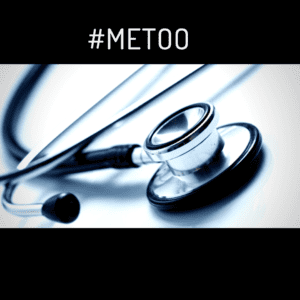The #MeToo movement is a movement against sexual harassment and sexual assault. #MeToo spread virally in October 2017 as a hashtag used on social media in an attempt to demonstrate the widespread prevalence of sexual assault and harassment, especially in the workplace.
Initially, while the stories from women were predominantly from the entertainment industry, more and more stories came from other industries, with women and men telling their stories of sexual harassment and assault within business, government, music, sports and the church. As so many women came out to recount being sexually assaulted, this empowered other victims to come forward as well.
On social media, women in medicine also began to tell their stories in a safe space and often anonymously. When conversations happened, I was surprised by how many physicians, both men and women, were shocked that sexual harassment and assault was also occurring in medicine. However, when you think about it, #MeToo stories in medicine should, in fact, not be surprising. Like many of the other industries where countless #MeToo victims were coming forward, medicine too is composed of a hierarchy, starting in medical school, continuing through residency/fellowship and even continuing as attendings in practice.

One such physician, upon hearing these brave women coming under immense scrutiny to tell their #MeToo stories, decided to relive and recount her story of sexual assault by a physician colleague. She spoke with me, and has agreed for me to retell her story, as she wants to remain anonymous. Here is her story:
I was an attending at a large academic center. A new residency program director had been recruited; he was married, with children. We were assigned to work together during a day shift. Even though he was being friendly while we were working together, I felt that he was pulling rank, being a published author with more academic credentials than me. While I was trying to be polite, it was a busy day and felt like I had no time to chitchat.
After our shift ended, I felt I was being polite so I agreed to a drink together afterwards. We went to a bar near the hospital and as soon as we sat down, he began to get very flirty. I was trying to keep it light and made a joke reminding him “You’re married, right?’” His response: “Yes, but that doesn’t matter.”
I got up and went to the bathroom hoping to leave the bar and go home. Once I came out of the bathroom, he was waiting for me in the corner within the dark hallway. When I walked out, he grabbed me, pushed me against the wall and started groping me. He grabbed my breasts and vagina and tried to push his lips up against mine. I tried to push him away. I again tried to keep it light and said things like “You’ve had too much to drink. What about your wife?”
I was trying to give him the opportunity to walk away, but he continued to grab me harder. I was scared as he pushed me against the wall even harder. He responded “You’re one of those cunts who likes to say ‘NO’ to feel powerful.” When I pushed him off me, I started to walk out telling him I was leaving. I was in shock. He insisted on walking me to my car. I was terrified since it was a dark parking lot and no one was around. He then tried to push me and make his way into my car, but luckily, I kicked him in the pelvis, pushed him away and drove off. For the first time in my life, I was genuinely scared.
I normally wouldn’t have been so coy and if it was another man, I would’ve had no trouble telling him to get lost. But I was trying to give him so many opportunities to change his behavior because we were work colleagues. He not only worked with me, but he was my superior! I was terrified for my career. If I handled it the wrong way, I’d put my career in jeopardy.
I was also worried about my physical safety since he had been so aggressive—what if he cornered me again? I struggled with what I should do. This was before the #MeToo movement, so there was no precedent for what I was supposed to do. Was I supposed to tell my boss that he tried to kiss me? I was afraid I’d be labeled the gossip girl, the one trying to cause trouble, especially since he was a married man. When I did see him again, he said “Sorry about the other night, things got out of hand.” Six months later, I quit that job. While there were other reasons for my resignation, this colleague was a large part of my decision.
When the #MeToo movement started to get a lot of press, in December 2017, I reached out to the Chair of our department. I sent her an email outlining the entire the story. While it was scary to recount the event, I realized it was important as I started hearing so many brave women coming forward with the #MeToo movement. I was concerned that as Residency Program Director, what if he had done this to others? He had so many other young women, residents, and trainees under his guidance in very vulnerable positions.
While I had blocked it out soon after it happened, hearing stories of other women made me realize I had to come forward so that hopefully this doesn’t happen to another woman who may be working with him. I am thankful to be able to tell my story anonymously and hope that it helps others to come forward.
While the physician who told her story above said it was helpful to her to share, I thank her for her courage to relive this moment in her career where she felt embarrassment, fear and anger. And we hope, as Women in White Coats, that this will help others who may have their own #MeToo Medicine story to tell. Please contact us if you’d like to tell your story.
Natasha K. Sriraman, MD MPH FAAP FABM is an Academic Pediatrician and Associate Professor of Pediatrics at Children’s Hospital of the Kings’ Daughters/Eastern Virginia Medical School. She is an Editor for the Women In White Coats blog and coauthor of “The Chronicles of Women in White Coats.” She can be followed on Instagram @Natasha.Mom.MD





Disturbing- but unfortunately it’s probably a common occurrence. Thank you for telling her story.
The culture in medicine is very hierarchical especially during the years of training. I’m sure there are many more instances of sexual assault or harassment, but women have been too afraid to come forward. There is too much at stake, especially when they have made a huge financial and time investment to become a doctor. Women not being able to report this is completely wrong and we need to support the women who do come forward.
No industry is immune to harassment and assault. I hope this empowers women in medicine and beyond to stand up to bullying, harassment and intimidation in the workplace and raise their voices in even less intimidating circumstances. Words are power – thank you for lending yours to educate and inspire others.